Chinese miniPC giveaway targets Apple, Microsoft
Mar 8, 2007 — by LinuxDevices Staff — from the LinuxDevices Archive — 16 views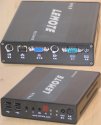 A Chinese government-funded company reportedly has gifted 1,000 miniPCs to partners, developers, and fans. Lemote hopes to challenge Apple and Microsoft in home-media and car-computing applications, and market the systems — which run Debian Linux on a MIPS64-like processor — to people in rural China.
A Chinese government-funded company reportedly has gifted 1,000 miniPCs to partners, developers, and fans. Lemote hopes to challenge Apple and Microsoft in home-media and car-computing applications, and market the systems — which run Debian Linux on a MIPS64-like processor — to people in rural China.
digg this story |
Lemote is jointly funded by the Chinese government and the Institute of Computing Technology (ICT) — the government-sponsored think tank that designed the Godson/Loongson chip on which Lemote's Fulong is based.
The Lemote Fulong Miniature Computers are based on Chinese-designed Loongson 2E processors. Loongson processors (formerly known as “Godson”) are based on a derivative of the MIPS64 architecture, albeit without patented portions, such as unaligned 32-bit load/store support.
Some of the systems went to Debian Linux hackers, and could help bootstrap an open source community around the MIPS64-like architecture.
Loongson chips could attract patent suits if marketed in the U.S., according to a Microprocessor Report study from last year; however, Lemote appears to be focused on the domestic Chinese market, at least for now. Additionally, French chip fabricator ST Micro may actually be producing the Loongson chip, ZDNet Asia suggests. ST works closely with MIPS architecture owner MIPS Technologies on the Open Cores initiative, and may actually be a MIPS licensee.
The Loongson 2E's performance is often compared to that of a Pentium III. However, the chip draws considerably less power — about 4 Watts under typical use for the entire Lemote Fulong box — compared to dozens of Watts for the processor alone in P-III-powered PCs.
System details
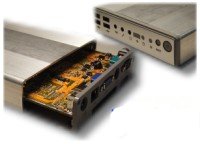 YellowSheepRiver Municator |
The Lemote Fulong is based on a 666MHz Loongson 2E processor. Otherwise, the device appears to be identical to the $150 Municator miniPC (pictured at right) promoted at last year's CES trade show in Las Vegas by YellowSheepRiver. The Municator was powered by a slightly older 500MHz Godson-2 chip.
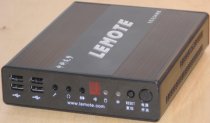
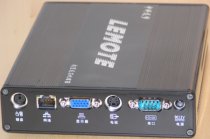
Lemote Fulong, front and back
(Images courtesy of Martin Michlmayr. Click to enlarge)
The Fulong has a single SODIMM RAM socket supporting 256MB of RAM, or 512MB under 64-bit operating systems. The system includes a 2.5″ (laptop-sized) 40 GB hard drive. I/O includes Ethernet, four USB ports, a single PS/2 port, IrDA, audio, VGA, and S-video TV out.
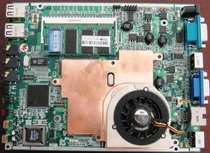
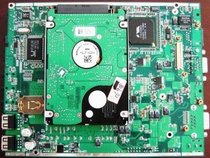
Lemote Fulong board, top and bottom
(Click to enlarge)
Early user reports
One of the Lemote Fulong system giveaways went to Debian Hacker Martin Michlmayr, who kindly posted photos and a brief description of the device in his blog. Michlmayr writes, “I'm really excited about the Loongson because it promises to make MIPS available on the desktop. In the coming months, I look forward to integrating Loongson support into Debian.”
Another Loongson blogger, Ubuntpku, reports that in 32-bit mode, Debian is already extremely stable, running for months at a time on the Lemote Fulong. The Debian-based Sunwah commercial Linux distribution also officially supports the Lemote Fulong.
Blogger Ubuntpku was among the first to receive a Lemote Fulong, in January. He reports that notwithstanding its MIPS-based power efficiency, the Lemote Fulong appears to have some power management issues. Other glitches include a poorly fitting case that can cause problems with USB and audio plugs.
Still, Lemote's greatest challenge, the blogger suggests, will be to solve the problem of creating a software environment. He or she writes, “Since Loongson is not a x86 CPU, in no way can it support M$ Windows. Software becomes the highest barrier for Loongson's road.”
The Lemote Fulong is available now for purchase, and is supplied with a customized version of Debian. It is priced at 1,600 RMB (~$207), according to a recent blog post at ZDNet Asia.
This article was originally published on LinuxDevices.com and has been donated to the open source community by QuinStreet Inc. Please visit LinuxToday.com for up-to-date news and articles about Linux and open source.